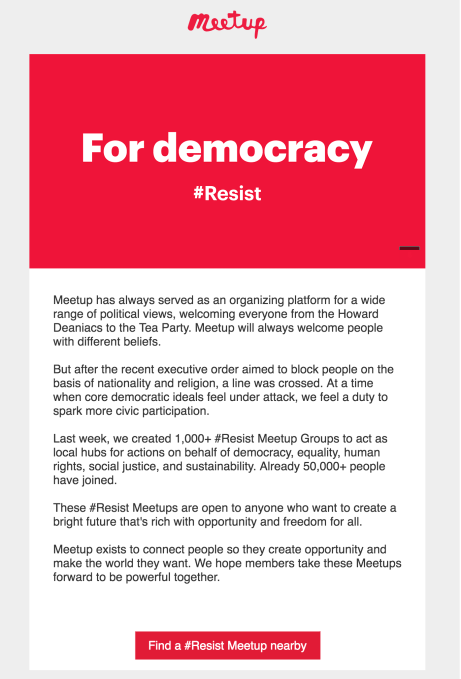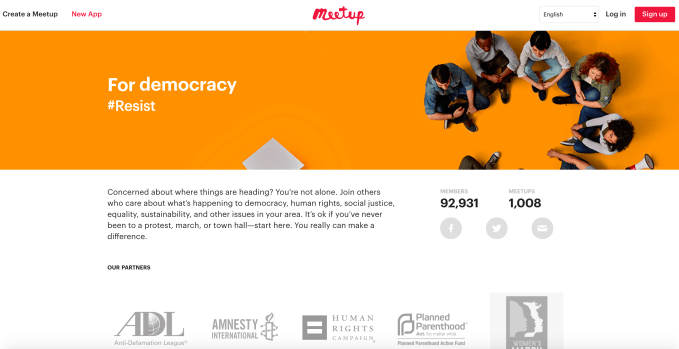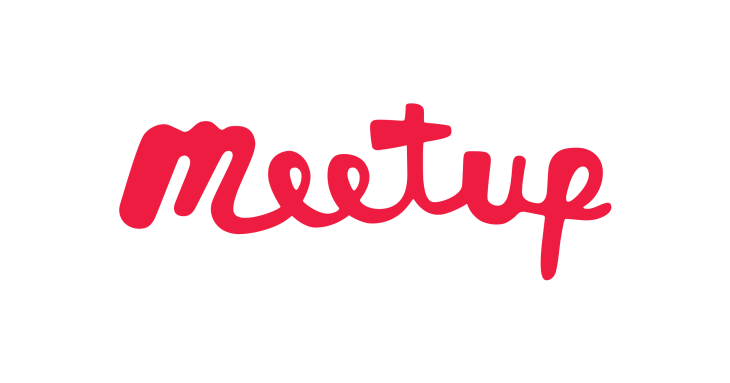Meetup, the site that helps people organize get-togethers like hiking trips and cooking classes, is taking a very solid political stance in the face of the new administration’s policies here in the U.S. — a move that has angered Trump supporters, who are deleting their accounts and calling for a boycott.
While Meetup’s platform is open to anyone on both sides of the political spectrum, the previously apolitical company has taken upon itself to seed the site with 1,000 #Resist meetup groups, and has emailed its 30 million members to alert them of that fact.
In the email, the company says that the site will always welcome people with different beliefs, but after Trump’s executive order aimed at blocking people “on the basis of nationality and religion,” it reads, Meetup says it felt a duty to spark more civic participation.
The message states there are now 1,000 #Resist groups on the site, which are meant to serve as local hubs for those who want to take action on behalf of “democracy, equality, human rights, social justice, and sustainability.”
In addition, the email included a link users could click to find a #Resist meetup locally.

The company, like many others today, had been struggling as to how it wanted to approach the situation in the U.S. with regard to the Trump administration and its controversial policies. Trump’s actions have led to protests and the organization of a “Resistance” movement, which is now more actively engaging in politics at federal, state and even local levels.
Much of this resistance activity has been taking place on Facebook through Groups and Events. The Women’s March on Washington, for example, grew out of a Facebook post that turned into a grassroots-organized event.
Earlier this month, Meetup decided it was time to take sides on the matter.
It stopped normal operations for two days to host a company-wide hackathon, whose goal to “unleash as much resistance on the Meetup platform as possible,” the company said.
As a result, Meetup launched these #Resist groups and rolled out product changes designed to make it easier for anyone to schedule meetups.
The groups were also launched in partnership with the Women’s March, Planned Parenthood, the Anti-Defamation League, Amnesty International and Human Rights Campaign. These organizations are helping supply templates for the Meetup events and making suggestions as to what people can actually do when they come together.

Ahead of the company’s email, 11,500 members signed up for the groups during that first weekend. By the time the email was sent, 50,000 members had joined. And today, the groups have grown to include more than 90,800 members.
There are now 500 more groups in the process of getting set up, in addition to the original 1,000, and 15,240 Meetup members have RSVP’d to 2,453 scheduled events.
As expected, Meetup’s move has enraged those on the opposite side of the political spectrum.
Many are calling for a boycott, deleting accounts or saying they’re angry at Meetup for stirring political unrest.
https://twitter.com/andieiamwhoiam/status/831309229277532160
Above: An angry tweet. It’s not clear if the user is intentionally using imagery from a movie about a family fleeing the Nazis, or if the irony was lost on them.
Meetup isn’t the only tech company to be impacted by U.S. politics, or face a boycott because of their positions.
On the flip side, those protesting Trump’s immigration and refugee ban led a campaign to boycott Uber, when they believed it to have taken advantage of a taxi strike against the ban to promote its own car-hailing service. (Users were also concerned about Uber CEO Travis Kalanick’s politics, given his position as an economic advisor to President Trump.)
A cynic could argue that Meetup saw the opportunity to bring the growing number of Resistance members to its own site, boosting its user base numbers and therefore its revenue. But making a decision like this is a risk for a company like Meetup, which is dependent on paid subscriptions. It went into this knowing it would lose Trump supporters as members, and anger others.
CEO Scott Heiferman explains why Meetup went this route. “We felt an obligation to our country and to humanity to stand up for core values of democracy. We heard people after the Women’s March. We heard people wanting to do something,” Heiferman told TechCrunch. “We knew our platform could help people.”
He also noted that Meetup took a cue from organic activity already on the site, where meetups like this were mobilizing quickly.
Heiferman also expected there would be a backlash, but moved forward anyway.
“We feel more compelled to stand up for rights of those who might suffer. We knew our platform could empower people to take actions locally — because it was already happening,” he said. “And we chose not to stay quiet out of fear.”
